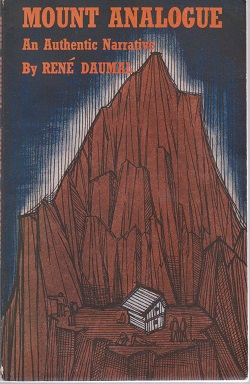Mount Analogue (nonfiction): Difference between revisions
No edit summary |
No edit summary |
||
| Line 1: | Line 1: | ||
[[File:Mount Analogue by Rene Daumal.jpg|thumb|Front cover art for the book ''Mount Analogue''.]]'''''Mount Analogue: A Novel of Symbolically Authentic Non-Euclidean Adventures in Mountain Climbing''''' is a classic novel by the early 20th century French novelist René Daumal. | [[File:Mount Analogue by Rene Daumal.jpg|thumb|Front cover art for the book ''Mount Analogue''.]]'''''Mount Analogue: A Novel of Symbolically Authentic Non-Euclidean Adventures in Mountain Climbing''''' is a classic novel by the early 20th century French novelist René Daumal. | ||
The novel is both bizarre and allegorical, detailing the discovery and ascent of a mountain, which can only be perceived by | The novel is both bizarre and allegorical, detailing the discovery and ascent of a mountain, which can only be perceived by realizing that one has traveled further in traversing it than one would by travelling in a straight line, and can only be viewed from a particular point when the sunrays hit the earth at a certain angle. | ||
"Its summit must be inaccessible, but its base accessible to human beings as nature made them. It must be unique and it must exist geographically. The door to the invisible must be visible." | "Its summit must be inaccessible, but its base accessible to human beings as nature made them. It must be unique and it must exist geographically. The door to the invisible must be visible." | ||
Daumal died before the novel was completed, providing an uncanny one-way quality to the journey. Father Sogol – the "Logos" spelled backwards – is the leader of | Daumal died before the novel was completed, providing an uncanny one-way quality to the journey. Father Sogol – the "Logos" spelled backwards – is the leader of an expedition which sets out to climb the mysterious mountain that unites Heaven and Earth. | ||
Mount Analogue was first published posthumously in 1952 in French as ''Le Mont Analogue. Roman d'aventures alpines, non euclidiennes et symboliquement authentiques''. | ''Mount Analogue'' was first published posthumously in 1952 in French as ''Le Mont Analogue. Roman d'aventures alpines, non euclidiennes et symboliquement authentiques''. | ||
The book was one of the sources of the cult film ''The Holy Mountain'' by Alejandro Jodorowsky. The novel also marks the first use of the word "peradam" in literature, an object that is revealed only to those who seek it. | The book was one of the sources of the cult film ''The Holy Mountain'' by Alejandro Jodorowsky. The novel also marks the first use of the word "peradam" in literature, an object that is revealed only to those who seek it. | ||
[[Category:Books]] | [[Category:Books]] | ||
Revision as of 20:21, 14 June 2018
Mount Analogue: A Novel of Symbolically Authentic Non-Euclidean Adventures in Mountain Climbing is a classic novel by the early 20th century French novelist René Daumal.
The novel is both bizarre and allegorical, detailing the discovery and ascent of a mountain, which can only be perceived by realizing that one has traveled further in traversing it than one would by travelling in a straight line, and can only be viewed from a particular point when the sunrays hit the earth at a certain angle.
"Its summit must be inaccessible, but its base accessible to human beings as nature made them. It must be unique and it must exist geographically. The door to the invisible must be visible."
Daumal died before the novel was completed, providing an uncanny one-way quality to the journey. Father Sogol – the "Logos" spelled backwards – is the leader of an expedition which sets out to climb the mysterious mountain that unites Heaven and Earth.
Mount Analogue was first published posthumously in 1952 in French as Le Mont Analogue. Roman d'aventures alpines, non euclidiennes et symboliquement authentiques.
The book was one of the sources of the cult film The Holy Mountain by Alejandro Jodorowsky. The novel also marks the first use of the word "peradam" in literature, an object that is revealed only to those who seek it.
